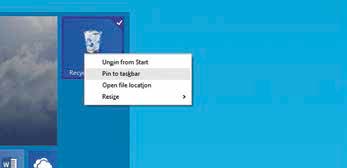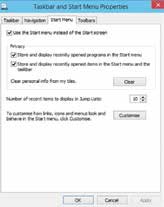Following the tradition Microsoft unveiled the next version of its
Windows operating system. Called as “Windows 10”, it’s something
Microsoft should have released two years back. The technical preview is
already release and if you've had your hands on it here are some tips
and tricks that you should definitely try.
Resize Start menu in Windows 10
In Windows 10 Microsoft brought the very anticipated feature – the
‘Start Menu’ back. The new Start Menu has a revamped design with the
touch of the Metro UI as well. One unique Start Menu feature
that never existed in the previous versions was the ability to resize
it. In Windows 10 you can now resize the Start Menu by dragging the top
edge upwards and downwards.
Change Start Menu colour
in Windows 10
Start Menu that replaced the Start Screen can now be customized as well.
You can change the default Start Menu colors to stylize your desktop.
To change the color open the Start Menu > Right-click on any empty
space > Personalize > Choose your color.
Add recycle bin on the taskbar in Windows 10
Until today the Recycle Bin could never get its place on the Taskbar.
However, with Windows 10 Microsoft has made it possible for you to add
the Recycle Bin icon to it. This makes it easy to access it quickly.

Pin the Recycle bin from the Start Screen to add it to Taskbar.
To place the Recycle Bin on the Start Menu first you need to place it on
the Start Screen (like you did it in Windows 8) > right-click on the
icon > click on ‘Pin to taskbar'.
Hotkeys in Command Prompt in Windows 10
To select text use: SHIFT + LEFT ARROW / RIGHT ARROW
• To select all: CTRL + A
• To copy: CTRL + C
• To paste: CTRL + V
• To enable Mark mode: CTRL
+ M (lets you use mouse for
selection)
• To enable history navigation:
CTRL + UP ARROW
• To find in console dialogue:
CTRL + F
• To close command prompt:
ALT + F4
Learn the new keyboard shortcuts in Windows 10
With glut of new features comes new shortcuts. The multiple desktops,
task view and others can be accessed with a simple keyboard shortcut.
Here are some of the important keyboard shortcuts for the keyboard
junkies.
• Snapping window: WIN +
LEFT or RIGHT (can be used
with UP or DOWN to get into
quadrants)
• Task view: WIN + TAB –
New Task view opens up
and stays open.
• Create new virtual desktop:
WIN + CTRL + D
• Close current virtual
desktop: WIN + CTRL + F4
• Switch virtual desktop: WIN
+ CTRL + LEFT or RIGHT
Disable Start Menu and enable Start Screen in Windows 10
Seriously Microsoft? Do you really think anyone would like to go back to
Start Screen when they have the “Start Menu”? In case if you are an
exception among the Windows users and want the Start Screen back,
Microsoft lets you do it in a single click.

Check “Use the Start menu instead of the
Start screen” to get back the Start menu
To do it, right-click on the Taskbar > Properties > Start Menu tab
> Uncheck “Use the Start menu instead of the Start screen”.
Make Start menu look like Windows 7 in Windows 10
Clubbing the features of the two major predecessors, Windows 10 brings
live tiles into the Start Menu. However, if it’s not your cup of tea you
can stick to the oldfashioned Start menu as well. To do it, firstly
you’ll need to unpin all the tiles from the Start menu, which will make
it minimal. Secondly, pin the tiles that you want for quick access.

Remove unwanted clutter to
make the Start Menu look like
Windows 7
Do it by switching to the”All apps” view > right click on the app
> Pin to Start. Lastly, you can also change the color of the Start
menu to make it look like that from the Windows 7.
Add more virtual desktops as you need in Windows 10
Virtual desktops have been a part of Mac and Linux since long time.
Windows finally gets this feature in its latest release. Called as “Task
View” in Windows, it resides on the Taskbar. To add a virtual desktop
click on the “Task View” button located on the Taskbar, then click on
“Add a desktop” and a virtual desktop will be added. You can similarly
add array of desktops as you need. Going to the Task View will present
thumbnails of all the desktops created.
Know the Windows 10 keylogger in Windows 10
Windows 10 differs from the other Windows operating systems in terms of
privacy. In addition to how long it takes to open a file or details
about your hardware, Microsoft is also collecting keystrokes and spoken
text. Microsoft claims that it’s collecting users’ voice information
when they use speech-to-text to improve their speech processing. In
addition to this, your entered text is also collected to improve the
autocomplete and spell check features. Microsoft is providing this to
unspecified “partners” as well. So be careful while typing anything.
Make use of the Bing Search in Windows 10
Microsoft has integrated Bing search right into the Start menu. When you
search in the Start menu you’re offered with Bing web-search results
along with the local Start menu results. In addition to this, a new
Search app is also pinned right on the taskbar next to the Start button.
When you click it, you will be presented with Search Menu
 Use the “Search” button to quickly get access to the Bing Search
Use the “Search” button to quickly get access to the Bing Search


Post a Comment